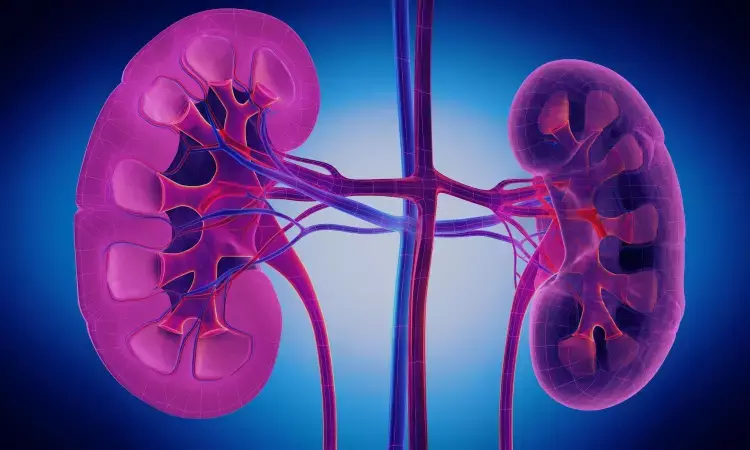- Home
- Medical news & Guidelines
- Anesthesiology
- Cardiology and CTVS
- Critical Care
- Dentistry
- Dermatology
- Diabetes and Endocrinology
- ENT
- Gastroenterology
- Medicine
- Nephrology
- Neurology
- Obstretics-Gynaecology
- Oncology
- Ophthalmology
- Orthopaedics
- Pediatrics-Neonatology
- Psychiatry
- Pulmonology
- Radiology
- Surgery
- Urology
- Laboratory Medicine
- Diet
- Nursing
- Paramedical
- Physiotherapy
- Health news
- Fact Check
- Bone Health Fact Check
- Brain Health Fact Check
- Cancer Related Fact Check
- Child Care Fact Check
- Dental and oral health fact check
- Diabetes and metabolic health fact check
- Diet and Nutrition Fact Check
- Eye and ENT Care Fact Check
- Fitness fact check
- Gut health fact check
- Heart health fact check
- Kidney health fact check
- Medical education fact check
- Men's health fact check
- Respiratory fact check
- Skin and hair care fact check
- Vaccine and Immunization fact check
- Women's health fact check
- AYUSH
- State News
- Andaman and Nicobar Islands
- Andhra Pradesh
- Arunachal Pradesh
- Assam
- Bihar
- Chandigarh
- Chattisgarh
- Dadra and Nagar Haveli
- Daman and Diu
- Delhi
- Goa
- Gujarat
- Haryana
- Himachal Pradesh
- Jammu & Kashmir
- Jharkhand
- Karnataka
- Kerala
- Ladakh
- Lakshadweep
- Madhya Pradesh
- Maharashtra
- Manipur
- Meghalaya
- Mizoram
- Nagaland
- Odisha
- Puducherry
- Punjab
- Rajasthan
- Sikkim
- Tamil Nadu
- Telangana
- Tripura
- Uttar Pradesh
- Uttrakhand
- West Bengal
- Medical Education
- Industry
Glomerular Hyperfiltration Raises Cardiovascular Risk in Type 2 Diabetes, Study Recommends Early Screening

South Korea: A study of over 1.9 million patients with type 2 diabetes (T2D) found that glomerular hyperfiltration (GHF) was associated with an increased risk of cardiovascular disease (CVD), particularly myocardial infarction (HR = 1.06) and heart failure (HR = 1.17).
"Patients with GHF (eGFR above the 95th percentile) had a 13% higher risk of CVD compared to those with moderate kidney function (eGFR between the 40th and 60th percentiles). GHF had the most significant impact on patients under 40 years of age," the researchers reported in the Clinical Journal of the American Society of Nephrology.
Seung Min Chung, Division of Endocrinology and Metabolism, Department of Internal Medicine, Yeungnam University College of Medicine, Daegu, Republic of Korea, and colleagues aimed to explore the effects of glomerular hyperfiltration on cardiovascular disease risk in patients with type 2 diabetes mellitus (T2DM).
For this purpose, the researchers conducted a retrospective cohort study using data from 1,952,053 patients with type 2 diabetes mellitus, sourced from the Korean National Health Insurance Service database between 2015 and 2016. Based on age- and sex-specific estimated glomerular filtration rate (eGFR) percentiles, patients were classified into five groups: <5 (low filtration), 5–40, 40–60, 60–95, and >95 (GHF). The study followed patients with incident cardiovascular disease (CVD), including myocardial infarction (MI), stroke, and hospitalization for heart failure (HF), until December 2022.
Key Findings:
- CVD occurred in 214,111 patients (11%) in the study.
- The incidence rates for cardiovascular events were 36.1, 20.8, 18.3, 18.7, and 19.3 per 1000 person-years for the various eGFR groups.
- Both low filtration (HR = 1.56) and GHF (HR = 1.13) were linked to higher CVD risk compared to the eGFR 40–60 percentile group, displaying an inverted J-shaped relationship.
- GHF was associated with an increased risk of myocardial infarction (HR = 1.06), heart failure (HR = 1.17), and stroke.
- eGFR levels were associated with CVD risk across different subgroups, including age, sex, obesity, hypertension, and dyslipidemia.
- The impact of GHF on CVD risk appeared more pronounced in younger patients, with HRs of 1.30, 1.17, and 1.05 for those aged <40, 40–60, and ≥65 years, respectively.
This research emphasizes the need for greater awareness of the relationship between kidney health and cardiovascular outcomes in patients with diabetes. Given the growing global burden of T2DM and its associated complications, understanding how GHF contributes to the development of CVD could have important implications for patient management and treatment strategies.
As the study points out, early intervention for GHF in patients with T2DM could potentially reduce the incidence of cardiovascular events, improving long-term health outcomes for this at-risk population. However, further studies are needed to better understand the mechanisms behind GHF and its impact on cardiovascular health, as well as to evaluate the effectiveness of early screening and intervention strategies.
Reference:
Chung, Seung Min1; Jung, Inha2; Lee, Da Young2; Park, So Young2; Yu, Ji Hee2; Moon, Jun Sung1; Seo, Ji A2; Han, Kyung-do3,a; Kim, Nan Hee2,a. Effect of Glomerular Hyperfiltration on Incident Cardiovascular Disease in Patients with Type 2 Diabetes Mellitus. Clinical Journal of the American Society of Nephrology ():10.2215/CJN.0000000618, January 09, 2025. | DOI: 10.2215/CJN.0000000618
Dr Kamal Kant Kohli-MBBS, DTCD- a chest specialist with more than 30 years of practice and a flair for writing clinical articles, Dr Kamal Kant Kohli joined Medical Dialogues as a Chief Editor of Medical News. Besides writing articles, as an editor, he proofreads and verifies all the medical content published on Medical Dialogues including those coming from journals, studies,medical conferences,guidelines etc. Email: drkohli@medicaldialogues.in. Contact no. 011-43720751


